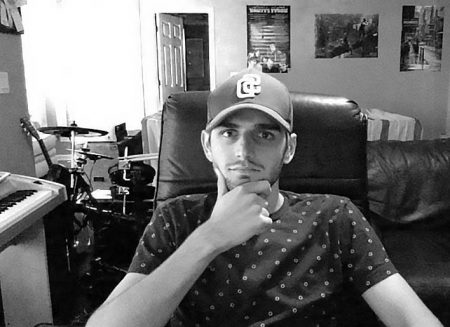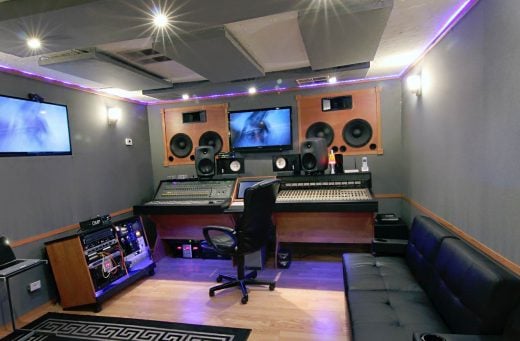
Recording Connection grad Wes Hagy
Recording Connection grad
Wes Hagy is a busy guy these days. Recently hired as a tracking engineer by his mentor Ira Parker at
Maximus Music in Charlotte, NC, he’s making the most of the opportunity to expand his working knowledge of audio engineering.
“I just want to try and master the tracking/engineering situation at Maximus as much as possible,” he says,
“just get as much experience as I can, with working with artists, working with that equipment, just getting the feel for that environment, and that would give me a little bit better idea of what I’m going to want to do specifically on a day to day basis in the music industry for the rest of my life.”
Wes’ personal journey into a music career is an intriguing combination of trial-and-error and self-discovery. Having a naturally analytical mind (“math head,” as he calls it), it seemed apparent he was meant for some sort of engineering, but finding his passion in it was another story.
“I was pretty good at math, and I didn’t know exactly what I wanted to do,” he says,
“so I went for Mechanical Engineering at NC State. Did a couple internships there, and just couldn’t really find the passion associated with it that I was looking for, but I knew that I really had the engineering mind.”
Disillusioned, Wes dropped out of college for a couple of years, to the chagrin of his parents.
“My parents were telling me, ‘You’ve got to do something. You’ve got to legitimize something. You got to go to school. You need to figure out another place you want to go,’” says Wes.
“Because to my parents, how they grew up, that’s the way it works. You go to grade school until you’re 18, and then you go to college, or you go to trade school, or you go to some sort of school. That’s the way there were taught, and, necessarily, the way that I work doesn’t really have to be that way. I was trying to make sure exactly what I wanted to do and the exact education that I wanted to get before I just jumped into another school.”
All the while, a different passion began to stir inside Wes’ soul—namely, a love for music that had first begun when taking piano lessons as a kid.
“After about two years, [I] met up with a buddy of mine who had been making music, really, since he was about…honestly, ever since I can remember,” he says.
“He used to sing or rap for everyone [with] his Apple Mac computer, like those ones that were like the station that had the microphone on the back of it. We got together and just started talking about the things and what we wanted to do as far as music goes, and it just really intrigued me.”
That rekindled passion eventually led to Wes taking up music again, along with an interest in shifting from mechanical engineering to audio engineering. But he knew he didn’t want to go back to school in the traditional sense.
“My mom and I were doing a lot of research looking for a place where I could get hands-on,” he says.
“I had been in so many schools and learned from someone just talking at me in a classroom. I was like, ‘If I don’t get in a place where I can actually work hands-on and see how a real studio operates, then I don’t think I’ll ever get the balls to actually start it by myself.’”
That’s when Wes says his mom discovered the Recording Connection.
“I talked to a couple of admissions counselors,” he says.
“I was actually amazed at how interested they really were in what I wanted to do, and really the direction I was trying to take my life, and they were very helpful every time I called back. It was just impressive to me, and it was worth the money and the time for me to see what the Recording Connection was like, because I’d never heard of anything, really, else like that before.”

Control Room A in Maximus Music
From his first meeting with his mentor, Ira Parker, Wes says they hit it off.
“He was a very welcoming guy. I didn’t feel intimidated or anything like that. I just really felt welcomed and at ease…After the interview, for the most part, every time I gave him a call, every time I texted him, or really, if there was an opportunity for me to come in, he would let me know…It seemed like he really took a liking to me, and it seems like we may have a little bit of future working together.”
Eager to learn, Wes immersed himself in the process, coming to the studio as often as he could, helping out with organizing and asking questions from his homework during the early part of the week, and sitting in on sessions over the weekends. As he learned the ropes and made himself useful, his passion paid off when Ira hired him as a tracking engineer. These days, even as a paid member of the staff, Wes considers himself in learning mode.
“Some of my favorite interactions with [Ira] are when I get to actually watch him create,” Wes says about this mentor,
“when he’s not really in that box mode, but when he’s getting to work with artists, and he gets to do some productions. It’s probably one of my favorite things…And in my head, I’ll have questions, just nonstop questions that I wish I could be like ‘Ira, stop. I need to ask you this right now,’ but you can’t always do that, especially if there’s an artist in the area…[so] I’ll write stuff down, and then we’ll have little interim conversations whenever he gets time…I learn by observing and then doing. I watch him, I watch him in his mode. I watch how he works, and then really just hone in on the key questions I want to get answered.”
In addition to his work at Maximus Music, Wes says he’s collaborating on some tracks with his buddy Justin Allie (the music friend mentioned above), and the two are working on some long-term goals, as well.
“The 5-10 year goal is really to have a writing and production company,” he says.
“My buddy Justin, he’s into writing lyrics, writing hooks. We call him ‘Captain Hooks’ because he can pull a hook out of his you-know-what in less than a minute and a half. But either way, he’s really good at writing, and I love to produce and create beats…really, that’s the way that I feel like it can get money to start with, to fund the ultimate goal.”
So how does someone transition from a technical career like mechanical engineering to a creative career like audio engineering? While some people see the technical and creative sides as two worlds in conflict, Wes sees them as collaborators, and as an engineer, he actually views his technical skills as a way to give creativity a voice.
“It’s really kind of like you’re this to the point where you’re either one [or] the other, and you see some people that have both,” he says.
“But it doesn’t always work that way…I feel like I have that, to the point where I can communicate between the people that have people skills and the creative artists. That’s why my seat as an engineer and my seat as a producer is that much more important, because that artist is going to want to try and communicate to me the message they want to get across, [and] I also need to interpret that message and help them present it in a fashion that these people who don’t understand creativity…can understand it, and feel the music the way that artist intended. Otherwise, that artist could be hidden and not really heard at all…I believe creativity has to start with structure.”
* * * * *



